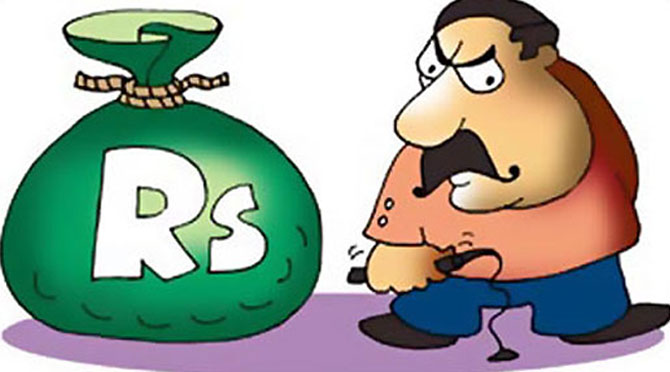 | « Back to article | Print this article |
The proposed measures aim to bring stricter norms to curb holding of illegal cash and mismanagement of unaccounted cash seized by the probe agencies during investigations.

To further discourage cash economy, a Special Investigation Team (SIT) on black money has proposed a cap on keeping cash at home and suggested that seized unaccounted cash by law and enforcement agencies be deposited in the Consolidated Fund of India (CFI).
The proposed measures aim to bring stricter norms to curb holding of illegal cash and mismanagement of unaccounted cash seized by the probe agencies during investigations.
Given the fact that unaccounted wealth is being held in cash, which is further confirmed by huge cash recoveries by law enforcement agencies, proper cash management can only succeed if there is a limitation on cash holding, the team said.
At present, federal agencies deposit unaccounted cash seized to the dedicated bank account of respective agency with State Bank of India where challan has name and permanent account number of assessees in whose name the amount gets deposited.
The recommendation has been made by the panel of retired judges and bureaucrats in its recent meeting held in Ahmedabad with central agencies, including income-tax, Enforcement Directorate, and Directorate of Revenue Intelligence.
The panel raised concerns over cash economy and malpractices like bribe during seizure of unaccounted cash.
The panel is learnt to have discussed certain instances reported during demonetisation where a major chunk of cash was mismanaged and diverted.
In the first full financial year after demonetisation (FY18), 67.91 per cent of unaccounted cash was made up of Rs 2,000 notes.
It was a bit lower at 65.93 per cent in FY19.
If implemented, experts say, this could be stringent for those businesses and even rural India where people keep cash at home.
Also, this could open litigation if the seized cash would go to CFI before finalisation of case.
In 2017, the government had introduced a cash transaction limit of Rs 2 lakh per day. However, there was no limitation on cash holding.
The SIT was constituted to ensure the government uncovers which Indians have hidden untaxed money in India and foreign bank accounts.
To understand the functionality of the CFI, an official said the fund, created under Article 266 of the Indian Constitution, includes the revenues received by the government and expenses made by it.
All expenditure incurred by the government is met by the CFI.
However, no money can be withdrawn for meeting expenses until the government gets the approval of Parliament.
The government’s Annual Financial Statement has three parts: CFI, Contingency Fund of India, and the Public Account of India.
Of these, CFI is the most important component of the statement.
States also have their own consolidation funds.